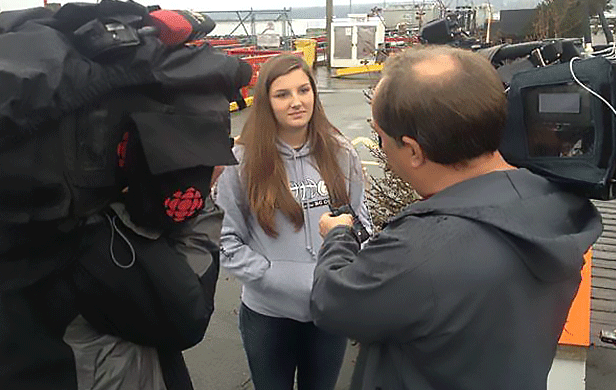
Freyja Reed’s October 29th dismissal from the U-15 Riptide girl’s soccer team in the Comox Valley was the culmination of complexities arising from the arrival of a new sponsor for the league, Marine Harvest Canada, BC’s largest operator of net-pen salmon farms. So began Freyja’s principled refusal to refrain from making critical comments about the ecological damage caused by salmon farming. The resulting controversy received repeated local and national media coverage, becoming a public relations disaster for Marine Harvest.
This was not what Marine Harvest intended. Ian Roberts, its spokesperson, said his corporation’s contributions to community groups “have not, and will not, and will never, direct a recipient’s right to voice their opinions or their ability to speak freely,” adding that “the disagreement with one member’s family is an internal matter between the club and the family.”
A social justice issue
Sean Arbour, the chair of the Riptide Steering Committee said that Freyja’s criticism had created a “bad spot” for the players and parents, that required her dismissal, noting:
[quote]At the end of the day, it’s all about the kids.[/quote]
If only the issue were so simple. The controversy is now about social justice, with other overtones that invite exploration — exactly what Marine Harvest was trying to avoid by sponsoring the eight Tier-2 teams of the league.
The decision to dismiss Freyja from the team was conveniently made by the Riptide Steering Committee, a move that seemed to absolve Marine Harvest of any direct responsibility. But the corporation is implicated, at least indirectly. Such corporate sponsorship is intended to seem altruistic and uncontroversial. But the real objective is to elevate the profile of the corporation as a respectable member of the community — with a subtle but implicit quid pro quo — we will support you, if you support us.
What is Marine Harvest buying?
Leveraging community support for the controversial practice of salmon farming explains why, as the CBC News noted, “the company sponsors more than 100 community organizations on Vancouver Island, including sports for young people.” For its part, Ian Roberts said he believes it’s legitimate for the soccer association to ask parents not to “speak ill” of the club and its policies. (The Reeds were criticizing the practices of the sponsor, not the club.) Furthermore, explained Roberts, Marine Harvest “provides youth an opportunity to not only participate in sports but participate at a reasonable cost” — a “cost” that would seem to be the suppression of critical thinking and the forfeiture of free expression.
The CBC News coverage placed this “cost” under the heading of “corporate opportunism”. And Dr. Margot Young, a University of BC law professor who specializes in gender discrimination in sports, concluded that, “[Freyja] is being muzzled. To say: ‘You give up soccer or you give up free speech’ is outrageous.” Although, as Dr. Young added, free expression under the Charter does not apply to sport teams or corporations.
Bad optics
But the optics for Marine Harvest are terrible when the ambitions of a talented 14-year-old girl are being thwarted because of a corporation already steeped in environmental controversy.
Sports are about fairness, ethics and principles, qualities that Freyja obviously had in abundance before she got entangled with Marine Harvest. Maybe her standards are too high for any of their teams.


Margot Young;
“‘You give up soccer or you give up free speech” is outrageous.
Indeed. Even more outrageous is the parents of the rest of the team and the teammates deafening silence on the issue; letting this young girl stand alone in her protestation re salmon farming.
It appears that acquiescence is favoured over taking a stand on something that harms one of our important provincial resources, our native fish habitat, and contaminates the ocean floor harming other species.
Not to mention the species from other locations that have been fished out in order to feed farmed salmon.
“Fairness, ethics and principles”.
That pretty much says it all for all that is lacking in not just Marine Harvest but pretty well all of the endeavours of our current provincial governance.
The absence in same of the previous federal governance earned them their ‘just desserts’.
Perhaps now there is hope for us in the largely ignored westernmost province.
Although time is of the essence, let us hope that “fairness, ethics and principles” prevail before it is too late to save our salmon, our agricultural heritage, our magnificent rivers and our common sense.